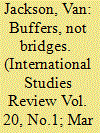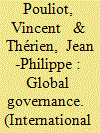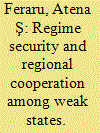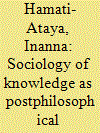|
|
|
Sort Order |
|
|
|
Items / Page
|
|
|
|
|
|
|
| Srl | Item |
| 1 |
ID:
158284


|
|
|
|
|
| Summary/Abstract |
Why might bilateral antagonism prove resilient to incentives for improvement from multilateral cooperation with shared third parties? Prominent theories predict that two actors with a record of cooperation in multilateral contexts would cooperate bilaterally as well; multilateralism is generally thought harder than bilateralism and provides opportunities for exposure and socialization that can facilitate preference convergence. This article presents Japan–South Korea relations as a deviant case for such expectations in the cooperation literature. Rather than think of multilateral cooperative contexts as “bridges” that facilitate closer, positive relations between actors, this case shows that multilateralism can instead be a “buffer” between two actors with negatively valenced ties, mediating bilateral friction sufficient to facilitate functional cooperation while insulating antagonistic national discourses or bilateral policies from pressures for change. In the case of Japan–South Korea relations, a pattern of simultaneous cooperation (with shared third parties) and friction (in bilateral interactions) over the same period illustrates a potential buffering logic of multilateralism; the multiparty context diffuses accountability for cooperative behavior that might otherwise generate domestic audience costs and allows policy elites to frame cooperation in a way that downplays or ignores the other.
|
|
|
|
|
|
|
|
|
|
|
|
|
|
|
|
| 2 |
ID:
158280


|
|
|
|
|
| Summary/Abstract |
Though scholars now view religion as a legitimate topic of study in International Relations (IR), most continue to ignore practices like prayer, despite the fact that prayer is present in global political contexts, including in the service-advocacy work of transnational faith-based organizations (FBOs). In addition, FBO funders like the United States Agency for International Development (USAID) require religious organizations to separate prayer from projects funded by these agencies due to contradictory perceptions about both the dangers and the inconsequence of incorporating “inherently” religious activities into development projects. The neglect of prayer in international relations scholarship and funding policies is, I contend, due to common ontologies of religious practice that link prayer with the transcendental, emotional, and private. Such ontologies lead scholars and others to assume that prayer is, and should be, materially and analytically distinct from the “real” work of FBOs. Drawing on interviews and participant observation of three FBOs working in areas of peace, development, and human rights, I argue that common ontologies of prayer employed by scholars of international relations and FBO funders do not accurately reflect the ontologies of FBOs themselves. Moreover, because scholars rely on such ontologies, they miss the ways that prayer manifests as a central, consequential, and sometimes political practice in the transnational work of FBOs.
|
|
|
|
|
|
|
|
|
|
|
|
|
|
|
|
| 3 |
ID:
158282


|
|
|
|
|
| Summary/Abstract |
Institutional legitimacy is often treated as a characteristic of an institution that generates authority, implying relative consistency across time and contexts. However, legitimacy is intrinsically relational and remains sensitive to changing political conditions and subjective perceptions. Introducing temporal and subjective dynamics of institutional legitimacy, this article applies greater conceptual precision to determining the role of legitimacy in shaping institutional change. It highlights how changing political conditions and subjective contestation over institutional authority routinely disrupts institutional legitimacy, resulting in cycles of institutional legitimacy in which institutions must navigate between pressures to adapt and obstructive disagreements over the direction and intensity of adaptation. The resulting conceptual framework provides insights into how institutional change is instigated, negotiated, and implemented that are missing from the current literature. I analyze the evolution of United Nations (UN) humanitarian intervention policy to elucidate how the dynamics of institutional legitimacy have shaped UN policy reforms since the Cold War and to illustrate how future scholars can tailor this framework to determine the extent to which legitimacy dynamics govern the trajectory of a variety of other international institutions.
|
|
|
|
|
|
|
|
|
|
|
|
|
|
|
|
| 4 |
ID:
158281


|
|
|
|
|
| Summary/Abstract |
Why is it so complicated to achieve collective action in global governance? This article focuses on one explanatory factor, according to which the global stage is pervaded by normative divisions. Our article helps advance this argument in three ways, by specifying the nature, scope, and mechanics of the global value struggle. First, we show that the distinct visions that clash in the conduct of global governance are formulated in a peculiar idiom of universal values based on contending and polysemous conceptions of the common good. Second, we highlight the ubiquity of universal value claims in global governance debates; regardless of their specific nature or standing, actors of all stripes defend their positions by referring to a certain understanding of the general interest. Third and finally, we specify the mechanics of the global value struggle as actors use the idiom of universal values to communicate and justify their viewpoints publicly. We illustrate our framework by looking into the debates that have structured two prominent cases of global policymaking at the United Nations: the adoption of the Millennium Development Goals and the negotiations over the reform of the Security Council. Overall, the article helps make sense of a counterintuitive dynamic in contemporary world politics: as it attempts to depoliticize global governance, the idiom of universal values actually ends up bringing politics back to the fore.
|
|
|
|
|
|
|
|
|
|
|
|
|
|
|
|
| 5 |
ID:
158283


|
|
|
|
|
| Summary/Abstract |
This article focuses on a category of states, referred to as weak, proven to evade entrenched international relations theoretical assumptions relating to sovereignty and government interests. It renounces these premises and builds on the argument that state weakness generates a peculiar security predicament that shapes governments’ internal agenda. It focuses on Migdal’s (1988) findings of a regime security-centered mindset shared by weak states’ leaders and asks the following: does this common mindset generate a common approach to regional cooperation? It answers this question by inferring a set of strategies toward external cooperation and proceeds by testing their empirical validity in relation to three of the most integrated regional organizations in Southeast Asia, Africa, and the American continent.
|
|
|
|
|
|
|
|
|
|
|
|
|
|
|
|
| 6 |
ID:
158279


|
|
|
|
|
| Summary/Abstract |
This article first aims to draw attention to, and diagnose, the failure of IR’s sociological turn to extend the domain of sociological reason into the philosophical turf of epistemology and thereby fulfill the full promises of the postpositivist turn. Its second purpose is to revive and deploy the radical version of the sociology of knowledge that can achieve an autonomous reconstruction of epistemology suited to a reflexive, post-Kantian consciousness. The diagnosis begins by tracing the erasure of the radical sociological position in the connected evolutions of sociology and international relations (IR). It shows that the derailing of the “sociological revolution” was paradoxically mediated by the consolidation of social constructionism and science studies, reproduced in IR through their counterparts in the “sociological turn”: constructivism and the sociology of IR. In these otherwise reflexive developments, the progression of sociological reason was halted by a self-imposed limitation on the extension of sociological analysis to all domains of thought and the endorsement of an idealist and institutionalist ontology of the social. A reformulation of the forgotten, radical sociological position clarifies the implications for IR of a transition to a postphilosophical theory of knowledge and delineates an empirical research agenda for such a reconstruction of epistemology driven by a sociology of knowledge of a revolutionary persuasion. Exploring the centrality of social practice in the social determination of knowledge, the article argues that, and shows how, a properly reflexive reconstruction of epistemology is best achieved by deploying the sociology of knowledge in two complementary materialist directions: (1) a sociology of everyday social practices that illuminates our epistemic immersion in the carpentered environments of the socionatural order and (2) a sociology of craft that objectivates the social constitution of the skholè as a mode of existential boundedness by addressing scholarly thought as differentiated social labor.
|
|
|
|
|
|
|
|
|
|
|
|
|
|
|
|
|
|
|
|
|